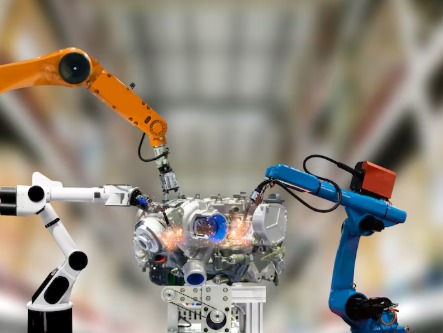Blockchain in the Gaming Industry
When we take a dive back into the history of the gaming industry, all we remember is the Super Mario game played on a 16-bit console. But fast forward to 2022, and we are playing games such as Gods Unchained, Crypto kitties, The Last Will, Decentral, and many more! As technology with blockchain engineering accelerates towards its zenith, the gaming industry goes from entertainment and fun to play to earn.
The majority of blockchain gaming is televised online, and players use virtual assets to attain certain goals and demonstrate their dominance. Asset tokenization has been enabled by blockchain technology, which implies that any digital or even physical asset can be transformed into tokens and then sold on marketplaces. Buyers will become owners of the things, and any sale or transfer of ownership will be recorded and securely preserved on the blockchain. Furthermore, every gamer can trace digital asset usage and verify its legitimacy.
As a result, gaming is gradually gaining recognition as a global sport. As per the DappRadar & Blockchain Game Alliance report from Quarter-1 2022, the blockchain gaming industry has grown more than 2000% in one year. Let’s dwell on how blockchain technology has revolutionized the blockchain and gaming industry big time.
The Impact of Blockchain Technology on Gaming
Blockchain is simply a decentralized, transparent ledger that is cryptographically kept on numerous nodes all over the world. For blockchain in the gaming industry, no single entity runs the network, no single database to attack or hack, and no way to reverse transactions that have already occurred. The low transaction cost makes it easier to send money or other tokenized assets like gaming cryptocurrency around the world. Because these transactions do not go via an intermediary, they are near real-time.
Some of these issues are addressed by blockchain in blockchain-based games:
- Transparency and verifiability
- The scarcity that is verifiable
- Security
- Items to Collect
- Exchange of digital assets
- Transaction time and cost
The convergence of blockchain and gaming creates an intriguing realm in which lifelike reality can exist in a virtual world. With developments in VR, this world may become more and more intertwined with our real-world experience than we can currently fathom.
Mainstream Gaming Companies’ Entrance to the Realm of Blockchain-Supported Gaming
Big companies like EA Sports, Zynga, Ubisoft, etc., have stepped into the realm of NFT (non-fungible tokens) gaming, perceiving blockchain technology in gaming industry as a potential revenue stream for global gaming in the coming years.
The French company behind the development of popular games Assassin’s Creed & Far Cry, Ubisoft, recently launched a limited edition NFT known as “Digits” within their military shooter game Ghost Recon Breakpoint. It made this company the first big publisher to add NFTs to a title, giving rise to a huge shift in the mainstream gaming industry to utilize blockchain technology. It further supports the thought that blockchain-based gaming is the next big thing in the gaming world.
How does it work?
A blockchain is basically a chain of data blocks on a network that is transparent to all users. It cannot be relocated or altered at any cost. This way, a full record of every activity that has transpired on the network with respect to the data is stored. The whole system of NFT and gaming is decentralized, which infers that the game is not controlled or owned by a central network or authority but instead by the users, who have digital assets and game objects.
We hold a certain number of digital assets known as NFTs on a gaming blockchain, which is similar to owning crypto coins like Bitcoin, Litecoin, or Ethereum on a cryptocurrency blockchain. Although these are treated as game objects, we hold them in the same manner as we would for cryptocurrency. Also, they are transferable not only to a wallet but also outside the realms of the game.
Blockchain in gaming through NFTs
Non-fungible tokens, or NFTs, are one-of-a-kind possessions that cannot be replaced by anything else. Their originality rather than their value determines their worth.
In blockchain in gaming, there is the incorporation of in-game NFTs. NFTs are a variety of collectibles that differ in different NFT games. NFTs or games crypto traded in an online war arena, for example, will be a variety of items that can be used to personalize gamers. These are visual upgrades to avatars, clothes, weapons, or talents. A gamer can sell an avatar she earned from the game to another gamer. This ensures that participants can communicate with one another.
Unlike most online games, blockchain NFT games ensure that game owner or players do not erase accumulated digital assets. The owner may keep all assets and NFTs for as long as they like and can transfer them between games. Aside from that, there is information sharing and utilization; thus, a player’s public profile can be moved from one game to another.
A few ways in which blockchain is transforming the gaming industry
Blockchain engineering technology creates a positive interaction between video games and cryptocurrency. Furthermore, blockchain has the potential to address numerous long-standing gaming industry challenges in the following ways:
Boosting the gaming market security
Hackers will find it almost impossible to track and break into the data through the server due to the blockchain’s USP of decentralization and extremely effective data encryption measures. Therefore, games based on blockchain are in a secure environment for game developers and entrepreneurs, resulting in higher productivity. Additionally, hackers would be helpless against decentralized blockchain networks since there are no central servers to hack into.
Elevating the ownership of in-game assets
By bringing more transparency and legislation to the business of gaming, blockchain technology can also assist in-game asset ownership. Actual digital ownership, which enables players to exchange profit and scarce goods, is one of the most vital elements of blockchain based games. In a blockchain-supported game, smart contracts are used to manage every transaction. Smart contracts work on pre-programmed parameters and are not reversible. Therefore, when we introduce a blockchain-supported game, each in-game asset bought through smart contracts is honestly transferred to the players’ public address accounts.
Great control over all our favorite video games
Blockchain Gaming networks developed cannot be muted. It ensures network-installed game programs and their subsequent series don’t change in the foreseeable future. This allows us to download and install video games in different versions from anywhere without compromising our gaming experience.
Trading resources and earning deserving rewards
Developers and gamers can utilize blockchain technology to develop rich and resourceful games and apps, upgrade game versions and earn rewards via blockchain game mining. In addition, blockchain video games enable them to collaborate and receive tokens while developing an immersive user experience on the gaming app.
The players have never been disappointed by the gaming business. However, while the growth of the internet helped advance the gaming industry, it could not keep cyber criminals and unethical players from acting out. Fortunately, blockchain gaming is the answer to protecting video games and building an industry standard for the long haul. As a result, video games and cryptocurrencies have the capacity to transform the whole gaming industry in several legitimate ways.
Conclusion
Blockchain technology, which was initially used to power cryptocurrencies, has evolved into a game-changing technology that can be applied to a wide range of sectors. Blockchain provides at least four distinct benefits to each sphere: decentralization, immutability, transparency, and better security.
Blockchain has brought many improvements to the gaming industry, including decentralization, a play-to-earn [crypto] model, NFT, and video games, and true ownership of in-game objects. Blockchain developers are still working to improve protocols and fix existing issues such as low scalability, high transaction prices, and energy usage.
While blockchain games are still in their early stages, and some obstacles will take time to overcome, the technology has the potential to flourish and carve out a position in the gaming industry.
FAQs
1. What are Web3 games?
Web3 gaming is a decentralized gaming process in which the actions of a gaming ecosystem or a game platform, specifically gaming asset ownership and decision-making in all elements of gaming, are delegated away from any central authority.
Web3 games are created by incorporating blockchain into the gaming ecosystem, allowing players to vote on when and how the game should progress. Web3 gaming also creates the groundwork for gamers to earn while they play by allowing asset trading, tradeable game tokens, and possibilities to earn in cryptos while playing.
2. How big is the blockchain gaming market?
Blockchain in gaming is making ownership of in-game assets easier, cheaper, and more trustworthy by leveraging technology such as NFTs. The limitless potential of blockchain technology in the gaming world is attracting millions of players and investors from around the world.
Blockchain technology is making inroads into a variety of industries, from finance to healthcare, but probably its most transformative effort has been in the gaming business. The blockchain gaming sector increased from zero-value market size to $3 billion in 2021. It is also expected to climb to $39.7 billion by 2025. The blockchain gaming sector has attracted over 1.5 million different gamers worldwide, thanks to NFT (Non-Fungible Tokens) creation capabilities and free-to-play and play-to-earn models.
3. What are the advantages of blockchain games?
Excellent Gaming Experience
The decentralized nature of blockchain-based games allows developers to design trustworthy servers that are not influenced by cheat codes. Furthermore, hacking Blockchain games is impractical due to the lack of failure points.
Genuine ownership of game assets
With blockchain engineering, gamers can become the actual owners of in-game assets, which is especially important for gamers who want to make money from their hobby.
Players-based governance
Unlike most traditional video games, which are centralized and controlled by producers, blockchain games give players influence over the rules they want.
System of decentralized gaming
Developers can use Blockchain technology to create a hybridized paradigm in which the economy runs on the blockchain, but other game components are stored on centralized servers. This model will increase the security of game economies by promoting scarcity and deterring fraud.
4. How do NFT games earn money?
NFT games can generate cash in a variety of ways. The most popular is through in-game transactions, in which players of crypto-based games can use real-world dollars to purchase things or power-ups. Real-world currency can be used to purchase things or power-ups that aid in-game progression. This form of purchase is commonly referred to as a “microtransaction.”
Some NFT games also have paid subscriptions that allow players to access special material or features. A premium member, for example, may be able to purchase uncommon things in the game that non-members do not have access to.
Finally, certain NFT-based games may allow third-party corporations to purchase advertising space. This sort of advertisement is referred to as “in-game advertising.” Banner ads, product placement, and video adverts are all examples of in-game advertising.



